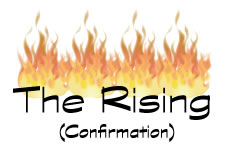 Back in February, Fourth Church Rising participated in a great homelessness immersion experience with the Interfaith Council for the Homeless. You can read about it here.
Back in February, Fourth Church Rising participated in a great homelessness immersion experience with the Interfaith Council for the Homeless. You can read about it here.When I was cleaning off my desk last week, I found and filed the notes I took during our learnings and conversations that weekend. I thought I would share some of the more interesting facts and figures.
There are approximately 75,000 people who are homeless in Chicago every year. This covers the entire year. On a given night, there will be about 20,000 homeless people in the city. 10% of these people are between the ages of 12 and 18. That's 2,000 homeless teens in Chicago every night.
Across the country, 28% of Americans have been concerned about homelessness at some point in their lives.
It is often assumed that homeless people have become that way because of drugs, mental health, or because they just don't want to work. These are not the main causes of homelessness. The top four reasons for homelessness are:
- People who are employed and do not make enough money. There are 168 hours in a week. You would have to work 100 hours at minimum wage to earn enough to afford a one bedroom apartment in Chicago.
- No affordable housing. Public housing really doesn't exist in Chicago anymore. There are ten times as many people on the public housing waiting list than are actually in what's left of public housing. The minimum wait is about eight and a half years.
- Unexpected expenses caused by health issues or other emergencies. 70% of low income people do not have health care.
- Other causes: drug abuse, domestic violence, recently released from prison, mental health.
- Raise minimum wages to a living wage. It has been demonstrated that the common assumption that raising wages will cause expenses to go up is not true.
- Build affordable housing.
- Universal health care and emergency funds.
- Provide social services that can help people with these needs.
- Youth that come out about their sexuality to their parents and are kicked out of the house.
- Pregnancy.
- Drugs.
- Domestic violence.
Teen homelessness and this particular issue of gay teens coming out to their parents is something that I think we need to get involved in. Religion has often been used to create atmospheres of suspicion and prejudice that result in these types of situations.
We need to work toward creating a societal change such that teens are not afraid to accept their sexuality and feel free and supported when bringing this up with their parents. This won't be easy, but I truly believe that we are being called to this important work.















